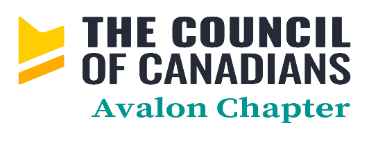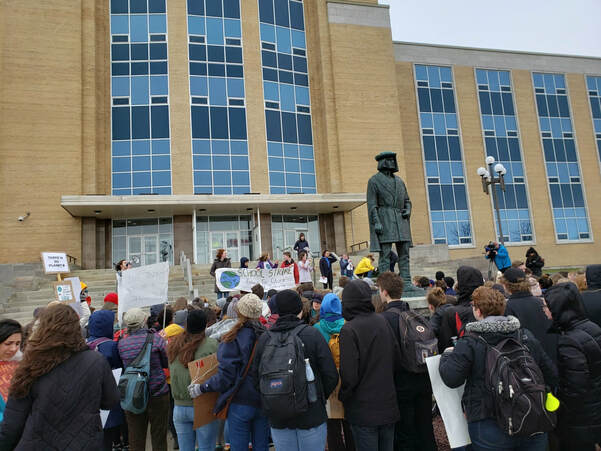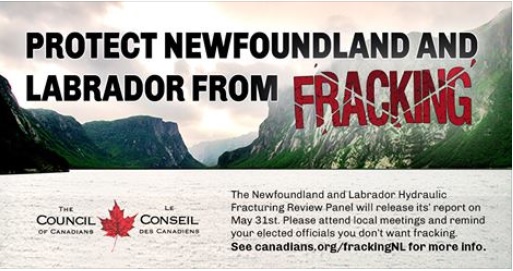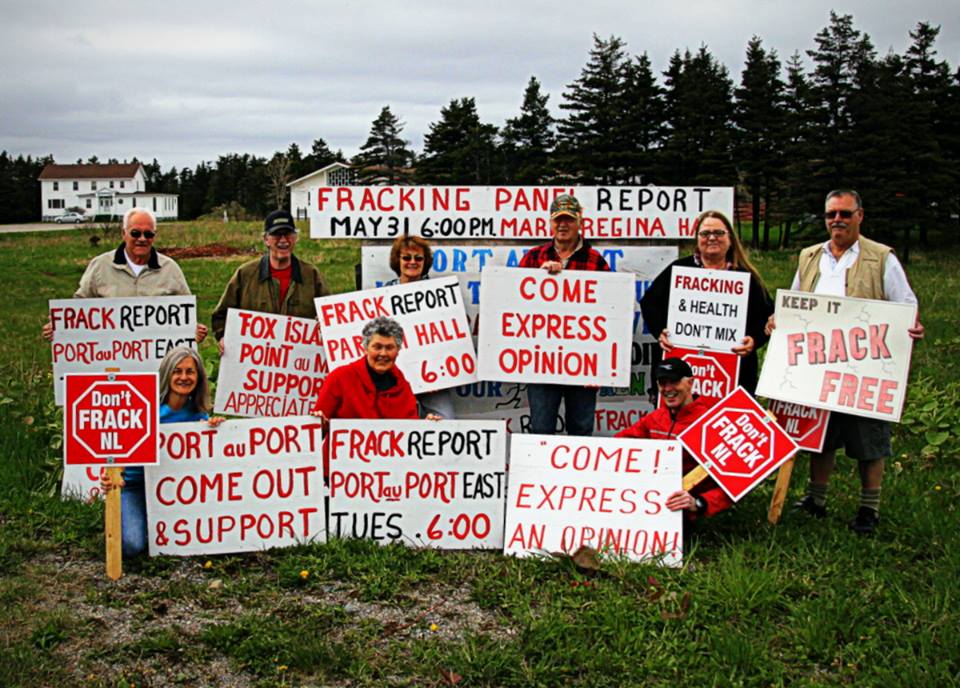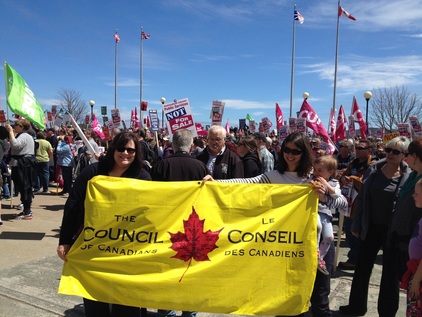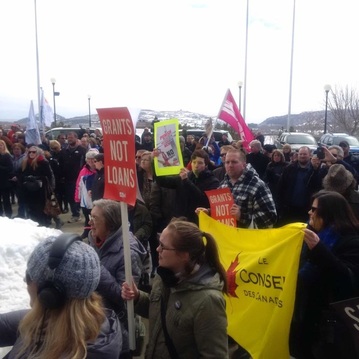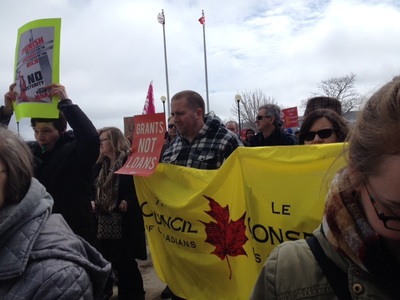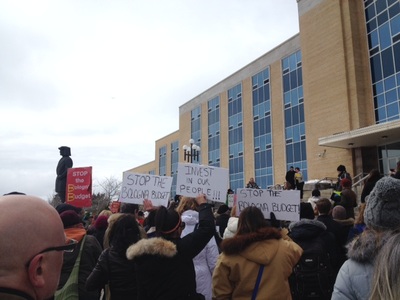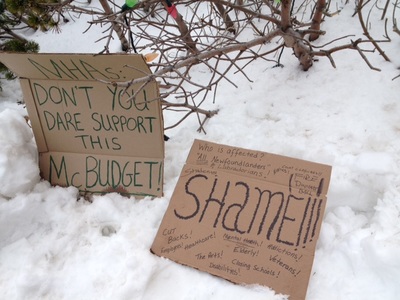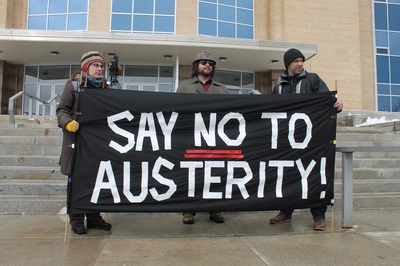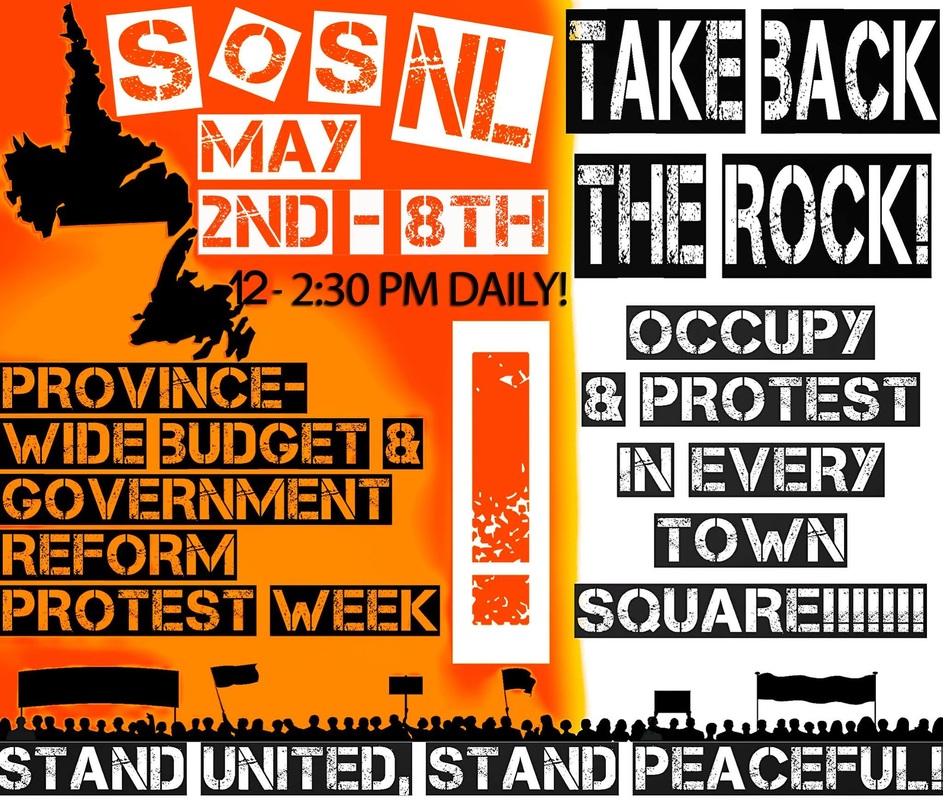|
(As published in a Letter to the Telegram, Nov. 7th) In his letter to The Telegram of Oct. 22nd, Tor Naess states correctly that “fossil fuel is in the process of being phased out as a preferred energy source,” and he goes on to give some of the reasons why — the principal one being the challenge of “meeting global climate goals.” However, he argues, since some 80 per cent of future energy requirements will still have to come from oil and gas through 2035 (itself a controversial estimate), the government should get busy and “encourage more offshore exploration activities through incentives.” Further, “the resources may stay in the ground unless developments are accelerated.” It is becoming hard to keep track of the players as they chase profits for a resource that is of declining value. This “acceleration” would be assisted by government through more incentives and by “streamlining” the approval process, including further weakening or removing regulations, which is the last thing our much-stressed marine environment needs. In other words, Naess is saying the province is at risk of seeing the demand for its fossil fuel resources decline and those resources essentially becoming valueless if we wait too long. This sounds like a desperate plea on behalf of an industry already in turmoil, and it sends the wrong message in these difficult times. It is becoming hard to keep track of the players as they chase profits for a resource that is of declining value. We have recently learned that Husky Energy — last month’s main petitioner for government subsidies for the West White Rose extension — is being bought out by Cenovus. Are we to be left with a “white elephant” at Argentia? China’s state oil company, China National Offshore Oil Corp., is chasing cheap oil in many other countries, and plans to start exploratory drilling in the Flemish Pass, no doubt encouraged by government’s new initiative involving reinvestment of forfeited security deposits. Perhaps there is a message here. The International Energy Agency (IEA) is promoting a sustainable energy pathway that will see carbon emissions reductions aimed at meeting the targets of the 2015 Paris Accord. As part of a path toward economic recovery, the IEA is calling for investment in reducing methane emissions as a way of mitigating some job losses in the sector, as well as efforts to phase out fossil fuel subsidies. The provincial government has two task forces at work now, one on the economy and the other focused on the fossil fuel industry. Both groups will hopefully be working toward a greener and more sustainable future in which the bulk of our known and unknown fossil fuels remain “in the ground.” John D. Jacobs, chair Council of Canadians, Avalon chapter _______________________________________
0 Comments
Below is our Letter to the Telegram published on November 4th. It concerns the composition of the Task Force which was formed to determine how to spend the $320 million in federal money allocated to job recovery related to the downturn in the oil industry.
............................................................................................................................................................................................... With the word “bubble” now so trendy, this seems a good time to critique the bubbles surrounding leadership in our dominant political parties. The Goliath of our troubled political bubbles belongs, without doubt, to the Conservative Party. We had a Conservative government ensconced in a bubble with a powerful premier at the centre, obedient minions in the civil service, and an entourage of business interests who cared only about immediate profits. No one outside that bubble was listened to. Result: Muskrat Falls. Then there were the Ball government’s bubbles. Probably the most memorable is that first incredible, 2016 budget attempt that put a levy tax of 1.2% on Newfoundlanders and Labradorians struggling with incomes less than $25,000, but only .45% on those making $200,000 or more. It was quite an amazing demonstration of how those in bubbles of privilege, even when well meaning, can have little understanding of the economic reality of ordinary people. Already there’s evidence that similar blinkered, bubble trouble may thrive with the new Furey government. An example is the Task Force recently commissioned to spend the $320 million allocated to the province by the Trudeau government. The federal money came with two loosely worded conditions - that it be used to support laid off oil workers and that it reduce carbon emissions. For those of us who thought that meant training and channeling workers into green economy jobs, dream on. What we got was a Task Force in which 19 of the 21 appointees came with strong links to the offshore industry. We’ve also got leadership in both the Liberal and Conservative parties itching to make sure that as much of that money as possible goes to helping the oil sector stay in the province. We shouldn’t be surprised. The oil sector is very, very good at getting money out of governments. According to a 2019 International Monetary Fund report, when you include damages done to the environment and atmosphere that the industry doesn’t pay for, the subsidies to oil in 2017 were a staggering $2.13 trillion or 2.7% of world GDP that year. And that was a typical year. Like other community groups, we do understand that the government is between a rock and a hard place, and that, at this point in time, we need to slowly transition away from our dependence on oil. But that transition may ultimately be necessary, like it or not. Choosing to minimize exposure to other points of view and other directions is what we don’t need. Prioritizing one “solution” above everything else is exactly the kind of bubble trouble that gave us our Muskrat Falls mess. Marilyn Reid, on behalf of the Avalon Chapter of the Council of Canadians For the last 30 years countries worldwide have been pushed into a globalization model. In the case of Canada we have signed multiple trade agreements.
There is a growing realization worldwide that while “free” trade has been very good for big transnational corporations and the financial institutions that back them, it has not been good for workers. According to a recent United Nations UNCTAD report, inequality and job precarity have grown substantially during that period. The UN has gone so far as to say that there is a cause-effect relationship here. We agree. We think it’s time to tell that story, particularly as it relates to Canadian workers. On that point, we hope you will consider watching this eight minute video that we have made on the Canadian government’s role and questionable rationale for so enthusiastically signing trade agreements. September 24, 2020
Dr. Andrew Furey Premier, Province of Newfoundland and Labrador Dear Premier Furey; We have followed with interest the initiatives of your first months in office as made public in the media. In your new role as premier of our province with all its challenges and potential, we send our best wishes and our hope for achieving a sustainable, equitable future for our citizens. We noted with concern the support you have given for further expansion of the offshore oil and gas industry and the program you announced September 24. As big investors worldwide turn away from fossil fuel industries toward investment in alternate energy initiatives we ask that our provincial government be doing the same. Here is an opportunity to shift our reliance on this segment of our economy by investing the unused exploration security deposits in the sustainable energy resources we have in abundance. We need to use our electricity for a green transportation infrastructure and to invest in programs to meet or surpass the climate targets our province has already committed to. Our skilled workers will also need help to transition to these new industries. As the current COVID-19 crisis has made abundantly clear, our national healthcare system is critical to all Canadians regardless of financial means. In March the federal Parliament voted unanimously on a motion in support of universal, national pharmacare for Canadians and in the Throne Speech the Prime Minister has promised to start discussions with the provinces. We ask for your support and commitment to implement this vital program. Laid off workers have lost their drug coverage and for so many Newfoundlanders and Labradorians the cost of drugs is beyond their means. Many do without or make dangerous choices to stretch their prescriptions which have costly personal and healthcare outcomes. Pharmacare is a critical piece of our socio-economic recovery and as documented (Parliamentary Budget Officer report), will be a health dollars saving in the long run. The real picture of poverty in our province has been clearly shown in recent months. It raises the question of why workers who work 40 hours a week to keep our systems and society functioning have incomes below the poverty line. We ask that your government swiftly implement a minimum $15/hour wage to support Newfoundland and Labrador workers as a basic step in addressing poverty. When those wages are spent locally it also can be a sustained boost to our economy. As seen previously, the push back from the local business community and corporate sector will be significant but many of those arguments have been used in the past to support slavery and keeping women’s wages lower than men’s. For a more just economy we need a livable minimum wage. We are looking to you and your government to implement policies that will provide a just recovery for Newfoundland and Labrador’s communities and which immediately take responsibility to meet or surpass climate targets. Yours respectfully, Yvonne Earle Avalon chapter, Council of Canadians In an interview with Ted Blais of CBC's ON THE GO, our chapter chair, John Jacobs, explains why we and other groups are opposed to proposed federal financial incentives to boost offshore oil and gas exploration in our province. Check it out here.
The following article by Andrew Robinson was published in The Telegram on June 13th. It summarizes the open letter which was sent to PM Trudeau regarding federal funding for oil and Gas.
Federal support for offshore sector would be misguided, critics say Open letter suggests funds better spent on clean industries, fisheries, tourism A campaign involving Newfoundland and Labrador’s offshore industry and other players looking for federal funding to boost the sector during a difficult time is receiving some pushback from multiple groups with ties to social justice and the environment. An open letter to Prime Minister Justin Trudeau was published Wednesday on the website of the Council of Canadians, asking him not to provide funds to support exploratory drilling in the province’s offshore. It is signed by representatives of 23 groups, including Coalition for a Green New Deal NL, Social Justice Co-operative NL, Grand Riverkeeper Labrador Inc., Sierra Club Canada Foundation and Greenpeace Canada. The combination of volatile oil pricing and the COVID-19 pandemic has been disastrous for the industry in Newfoundland and Labrador. The Newfoundland and Labrador Oil and Gas Industries Association (Noia) has reported that thousands of jobs have been lost. It’s also been projected that the province could lose $60 billion in gross domestic product in the next 18 years. Noia issued its own open letter last week, asking the prime minister to consider applying two previously used incentives — the Petroleum Incentive Program (PIP) and Atlantic Investment Tax Credit — to encourage exploration. NO SUBSIDIES This week’s open letter to Trudeau has a decidedly different take on the situation. In it, the groups call on government to look for other ways to help Newfoundland and Labrador’s economy, suggesting it would be better off supporting clean industries, fisheries and tourism instead of subsidizing petroleum exploration. “This would be more of a transition to something other than oil and gas for our economy,” said John Jacobs, chair of the St. John’s Chapter of the Council of Canadians. “There are certainly many options on that front. It’s exploratory drilling that really gets to me, because the fact is we have proven reserves. We have companies who were producing oil and shut down for other reasons. It had nothing to do with the COVID-19 crisis — (it’s) because of the world economy.” The groups argue that funding for the offshore sector would be incompatible with the climate commitments Canada and Newfoundland and Labrador have already made. Neria Aylward, an organizer with Coalition for a Green New Deal NL, noted the province recently committed to achieving net-zero carbon emissions by 2050. “In light of that, it makes even less sense, the advocacy they’re doing on behalf of the petroleum industry here in Newfoundland and Labrador,” she said. “The shift from a petroleum economy to a more diverse economy will not happen if our government is kind of playing for both sides. Right now ... petroleum isn’t profitable, we’re seeing that. What we’re asking is not for it to shut down overnight. We’re just asking that public money, which is limited ... that’s it’s not being given to an industry that’s in direct contravention of the government’s stated plans to be at net-zero by 2050.” WRONG PATH According to Jacobs, the province is not on a path to meet that target. He expects this year carbon emissions in the province will be down by four to seven per cent but that’s only because the pandemic slowed the economy. “This is comparable to the rates of decrease that we need, but we need that kind of decrease — something approaching 10 per cent year after year — for the next decades to limit the climate change,” he said. The letter suggests public trust in the industry has eroded due to safety concerns and regulatory oversight that tends to favour the interests of the oil and gas sector. It also notes the federal government is currently falling short on its commitment to eliminate fossil fuel subsidies, adding it should consult and seek consent from Indigenous people in the province before any further expansion of offshore activity proceeds. NOIA’S RESPONSE Noia CEO Charlene Johnson was out of the office Friday and unavailable to comment on the letter. In a statement released to The Telegram, Noia said it welcomes constructive debate, but reiterated its point that the industry is facing a “stark reality” that’s also hurting the province’s economy. “As well, the letter does not acknowledge the lower carbon emissions of our offshore oil compared to the global average, the dedication of the people who work in the industry to ensure stringent safety and environmental regulations are upheld, the commitment of the provincial government to achieve net-zero emissions by 2050, and the commitment of our industry to help lead the transition to renewable energy mixes and use our considerable expertise to do so. “Thousands of people are out of work and the future of an industry that provides substantive benefits to Newfoundland and Labrador and Canada is at risk. Noia will continue its advocacy efforts for support from the Government of Canada that allows our offshore to be globally competitive, attract investment and offshore exploration, and get people back to work and help our hurting economy. The consequences of not doing so would be disastrous to our people and province.” Our AGM’s focus this year was on how the obligation of NL communities to upgrade waste-water infrastructure in order to meet new federal guidelines might force some municipalities into public private partnership (P3) agreements. We’ve since had requests for more background information. Here it is. In defense of this rather long blog post, it is a multi-faceted issue.. ………………………………………………………………………………………………………………………………………. According to media reports, St. John’s, Mount Pearl and Paradise have to collectively come up with $250 million to upgrade their waste-water infrastructure. At the provincial level, NL municipalities could be looking at an overall cost of $600 million to meet the new federal regulations. The big question for all of us is where the money for these upgrades is going to come from. Our concern is that NL municipalities may be forced into some sort of public private partnership (P3). This posting explains what P3s are, why we are opposed to them, and how we think a P3 agreement might be imposed on us. Part A: A brief history of P3 agreements Part B: Why we oppose P3 agreements for waste-water infrastructure Part C: The role of the Harper government in promoting P3s Part D: The role of the new Canada Infrastructure Bank in P3 promotion Part E: Will our province be Ground Zero for the privatization of waste-water infrastructure? Part F: Joining the Blue Community Movement Part A: A brief history of P3 agreements In a typical P3 agreement a consortium of private sector players finances the project and provides the architectural, constructional and management expertise. A tightly bound contract is drawn up between government and the consortium. Then, over a 20 to 30 year period the private sector group reclaims the money from the public, either through tolls (P3 bridges and highways) or by directly charging governments (water infrastructure). Public private partnerships have been pushed as a solution to funding infrastructure upgrades since the 1990s. At that time, governing parties in the richer countries saw P3s as a way of shifting budgetary expenses to future years. This camouflage of expenditures allowed governing parties to look more fiscally responsible as elections approached. In the Global South the story was different. International organizations like the World Bank imposed privatization of one sort or another on governments, by making them a condition of a country’s loan agreement. In spite of the propaganda spouted by so many financial institutions, water related P3s have not for the most part been a success. Maude Barlow, our honorary chairperson at the Council of Canadians, and a former senior advisor to the UN on water related issues states it succinctly. “Private water and wastewater services employ fewer staff, cut corners on source protection, provide poorer customer service and charge higher rates.” Unfortunately for poorer countries with heavy debt loads, re-municipalization is not easy, given the continuing enthusiastic support of privatization by the international financial institutions. It’s a different story in richer countries, however. France, is a particularly interesting example of the recent pushback against P3. The country is the home of the two largest water corporations in the world (Veolia and Suez). Yet, since the year 2000 more than one hundred French municipalities have taken back public control of water. At a broader level, the European Court of Auditors has detailed widespread shortages and limited benefits in EU public private partnerships. It's not just water infrastructure P3s that are problematic. Part B: Why we oppose P3 agreements for waste-water infrastructure The concern of our local CoC chapter is that, just as the rest of the world is seriously questioning and retreating from the privatization of water, Newfoundland and Labrador may be forced into accepting a “P3 solution” for waste-water upgrades. Here are six reasons for our opposition to going the P3 route for waste-water infrastructure. 1. P3s constrain our human right to public water and sanitation. In 2010 the United Nations recognized the human right to water and sanitation as an essential part of the right to life. The Human Rights Council further clarified that governments have the primary responsibility to deliver these new rights. P3s obstruct and limit this responsibility. 2. P3s lead to the loss of public control. Given that P3s effectively grant monopolistic power to private sector consortiums, we should take note of what has happened elsewhere in the world. As Nicholas Shaxson, author of The Finance Curse, explains in his critique of P3s in Great Britain: “The top down state sets long term performance targets, which can never cover all the possible eventualities. The highly complex contracts are impossible to monitor effectively and influence in a changing world. The players constantly try to shirk and wriggle out of commitments and whenever there is a clash, the government which has outsourced its expertise to private actors gets dragged into bargaining games it can’t win. Government has lost its ability to understand what is going on.” 3. P3s impose additional costs and burdens on taxpayers and the local economy. US research indicates that private providers of waste-water infrastructure charge on average 63% more than governments for service delivery. Unfortunately, there are no Canadian statistics yet available on P3 waste-water projects. However, cost analyses have been done on other P3 projects (health care, transportation, etc.). As a result, six auditor generals, (Ontario, BC, Quebec, Nova Scotia, Saskatchewan as well as the federal auditor general) have made extensive criticisms of the additional costs of the P3 approach. Keep in mind also that the “partnership” between government and the private sector is rarely a partnership with local businesses. That’s because local businesses generally do not have the resources to meet the financial requirements of a P3. Instead, the partnership is invariably with powerful corporations with no emotional ties to local communities. That means that almost all profits will leave the province. Furthermore, in order to increase profits, P3 management often cut back on workers and benefits. That can have an effect on quality control. 4. Risks remain with the public sector. Canadian auditor generals also concluded that instead of transferring the risk to the private sector – one of the main justifications for privatization – provincial governments usually end up assuming all the risk in P3 arrangements. In other words, it’s public risks but private profits. 5. P3s could lead to permanent privatization. Did you know that there is a ratchet clause in the CETA trade agreement between Canada and the European Union that states that once a service has been privatized it cannot be re-municipalized as long as CETA exists? Water delivery is exempted. Waste-water is not. Currently, the perception is that government has the option of taking back control at the end of the project term. Under CETA, maybe not. It’s impossible to predict how any challenge to re-municipalization might play out in an ISDS court. 6. P3s unfairly disadvantage future generations. Under a P3 arrangement, the initial financing of projects is done by the private sector. In the past this has allowed governments of the day seeking re-election to look more fiscally responsible as project costs are pushed into the future. The neoliberal rationale for this decision has been that as the economy continues to grow it will be easier for future generations to pay the cost. Except that we now know that talk about future growth may be just a fantasy, particularly in our province. We would argue that this transfer of extra cost obligations to a future generation is no longer (if it ever was) an honourable option. Part C: The role of the Harper government in promoting P3s Way back in 2012 the Conservative government under Steven Harper introduced new regulations for waste-water infrastructure. These regulations, which were to come into force in the years leading up to 2020, required secondary processing standards for sewage treatment. Around 40% of Canadian municipalities were affected by this legislation at estimated costs between $18 billion and $24 billion. Here in our province, 90% of municipalities are theoretically required to upgrade at a cost of around $600 million. We say theoretically, because small communities will probably be exempt, simply because the effluents they dump into the ocean are below the threshold amount designated for upgrades. While we acknowledge the need and importance of upgrading waste-water infrastructure in our province we are suspicious of the real motives of the Harper government. After all, this was a government that deliberately gutted regulations related to Canada’s lakes and rivers, effectively leaving 99% of them unprotected. Consider the following two points:
Part D: The role of the new Canada Infrastructure Bank in P3 promotion The present federal government has withdrawn the insistence that public infrastructure projects over $100 million go the P3 route in order to access any federal grants. That’s good. What the Liberals have not done, however, is provide adequate funding through grants or loans so that municipalities can make the required upgrades to waste-water infrastructure. That doesn’t jibe with the Liberal campaign promise back in 2015 to spend money on building and strengthening Canadian infrastructure. Many voters envisioned that 2015 campaign promise as some sort of FDR New Deal where government would incur debt and then spend it throughout the country by subsidizing infrastructure projects, either through direct grants to lower levels of government or through loans to local businesses and municipalities. But that’s not what we got – not at all! During their first term of office the Liberal government formed the Canada Infrastructure Bank (CIB). This is a crown corporation completely controlled by the private sector. There appear to be no government representative on its board of directors and civil society groups have very little access to its deliberations and policies. The CIB’s declared mission is to build Canadian infrastructure through public private partnerships. But is that the way it’s really going to play out? We can’t help wondering how many CIB promoted P3s are going to end up capturing and controlling already existing public infrastructure - infrastructure like our waste-water systems. Furthermore, given the corporate control of the CIB’s board and administration it’s hard not to conclude that CIB sponsored P3 contractual agreements could be significantly biased in favor of the private sector consortia and the big corporations they represent. The CIB’s goal is to leverage private sector P3 investments of up to $140 billion over the next ten years. To that end the federal government has committed $35 billion to be spent over that time period. A small amount may go to municipalities. For example, Mapleton, Ontario was recently loaned $20 million to be put towards waste-water infrastructure upgrades. But here’s the interesting part. The caveat was that the $20 million was to be used to “attract private capital expertise” through a P3 agreement. If the CIB’s money is not being spent on directly financing infrastructure projects, where is the bulk of it going? It turns out that a large part of the $35 billion federal investment in the CIB is to be used to subsidize the borrowing costs for corporations bidding on P3s. That’s to be done by loaning consortium partners money at a lower rate than they could get on their own in the money markets. As a co-investor, the CIB can also mitigate some of the unexpected risks a consortium might face by injecting capital at key points. All of this makes P3 projects, even smaller ones like Mapleton (population 11,000), appear a lot less risky for the private sector. But still, the private sector would really prefer larger projects - which is why there is increasing reference to the concept of “bundling” on P3 promoting Internet sites. In the past, the term was used to refer to the bundling of different partners within a particular consortium. The new talk however, is of persuading communities to bundle together. A practical example would be if Lewisporte, Twillingate, Gander and Grand Falls bundled together as partners in order to encourage a P3 investor to come in at a lower cost option. Worse case scenario: The majority of municipalities needing upgrades across the province agree to bundling in the interests of saving money. Part E: Will our province be Ground Zero for waste-water infrastructure privatization? There is, of course, the possibility that our fears about the privatization of waste-water infrastructure are unfounded. P3s for waste-water management have not to our knowledge been formally proposed. That doesn’t mean, however, that they won’t eventually be slid onto the table. Certainly, the federal government is pushing municipalities to do something. As reported in a CBC article, in some cases town managers in NL municipalities that don’t have an infrastructure upgrade plan in place have been threatened with $500,000 fines and two years in prison. The federal government is obviously well aware that our towns are several hundred million dollars short of having the money to make the required upgrades. Why then this bullying unless it is to push communities into a corner where they believe P3s are the only way out? That raises questions about how much support municipalities that want to resist a P3 “solution” are going to receive from the provincial government. There are reasons for pessimism. First, it is very possible that the present Liberal government is, itself, in favour of a P3 “solution” for our waste-water infrastructure crisis. Since taking office in 2015, the Liberals have gone the P3 route for the proposed mental health hospital, the new prison and two nursing homes. By contrast, there were no P3s in Newfoundland and Labrador prior to 2015. The Liberals may also argue that they simply can’t find the money given the current fiscal problems the province faces. This fiscal dilemma is further complicated by a federal government that appears to be ideologically slanted towards some sort of privatization of public infrastructure. Does that mean they won’t consider other strategies like actually loaning federal money to our municipalities or pushing into the future the 2020 deadline? Who knows? The one bright point is that we have a minority government with potential opposition to the P3 route from the other parties. But will they come out against P3s and will they look for other solutions? Water related infrastructure is very possibly the next frontier in the private sector’s quest to gain greater control of Canada’s lucrative public infrastructure delivery. If that is so, our province, thanks to its dismal fiscal situation and the many communities needing upgrades, may well be Ground Zero in that power shift. Part F: Joining the Blue Communities Movement Did you know that, in the developed world, Paris, Berlin, Bern, Brussels, Los Angeles and many other cities have become Blue Communities? The Blue Community movement was initiated back in 2009 by the Council of Canadians in partnership with CUPE and the Blue Planet Project. Blue Community members commit to three things.
We would like Newfoundland and Labrador municipalities to consider joining the 27 other Canadian communities right across the country in becoming a Blue Community. But let's be practical. First, we have to acknowledge that there may be forces in the business community and in government that are going to push privatization at us through a P3 agreement. If and when that push come we have to be ready to say NO to any P3 agreement on our water infrastructure delivery. Come join us for our Annual General Meeting on Saturday (November 30th) at 2 p.m. in Sobeys Community Room on Merrymeeting Road. The focus of this year's AGM will be the increasing pressure to privatize public services through public private partnerships (P3s). We'll be talking specifically about how this could play out with respect to required upgrades for our province's waste-water infrastructure.
Here's our agenda: Welcome John Jacobs, Chair Minutes from 2018 Annual General Meeting Annual Report of Chapter Activities 2019 Treasurer’s Report Marilyn Reid Update from the Atlantic Regional Office Angela Giles Topic for Discussion Upgrading NL's waste-water infrastructure: The risk of a P3 "solution". Future Directions Other Business Maude Barlow will be here in St. John's on Monday, September 23 (6:30 p.m. at the Lantern, 45 Barnes Road) . She will be talking about her new book WHOSE WATER IS IT ANYWAY and promoting the concept of Blue Communities. We hope you will consider attending.
NL municipalities are currently facing a crisis as they scramble to find the funding required to upgrade our waste-water infrastructure. There is a very good chance that many will be pushed into a public-private partnership (P3). Maude will be able to give an international perspective on why that is a bad idea. If you can't make the meeting but would like background information on why our local chapter is so opposed to P3s, check out our opinion piece in The Independent. On Friday, May 10th, our chapter joined the 200-300 people who marched to the Confederation Building to protest government inaction on climate change. The demonstration was organized by local high school students in support of the growing global movement, Fridays for Future. As you can see from the picture that John took, it was a spirited demonstration. It was great to see such commitment on the part of our young people. We believe they are absolutely right in their insistence that the time to act is now. And we are glad to see that at least some world leaders are beginning to listen. There is now a “moral, ethical and economic imperative” to take more action to mitigate the existential threat posed by climate change." So said by top executives from across the United Nations system on Thursday of last week.. It was a follow-up to the huge United Nations report just published detailing the extent of the man-made environmental crisis we are now facing. We couldn't help but note that the four key measures UN Secretary-General António Guterres said governments should prioritize focused on reducing fossil fuel They were 1. Halting the subsidies to fossil fuel industries 2, Taxing pollution or carbon emissions more and people's salaries less. 3. Stopping the construction of new coal plants 4. Shifting the focus to a green economy, not a grey economy Unfortunately, it's a message that apparently our two major parties don't want to hear. While the NDP and NL Alliance spoke at the demonstration both the Liberal and Conservative Parties were noticeable by their absence. That was disappointing. When: Thursday, April 18th at 7:30 p.m.
Where: MUN Arts and Administration Building A1043 Parking will be available in Lot 15B Nature NL and the Council of Canadians will be screening Burned: Are Trees the New Coal? – a film about using our forests to feed generators to produce electricity. European Union policy makers decided biomass was “green” i.e. renewable energy. This has led to wholesale destruction of forests in the southeastern US and elsewhere to feed huge thermoelectric plants in the UK and Europe. The practice is now spreading to eastern Canada. More information is available at http://naturenl.ca/event/environment-film-night-burned-are-trees-the-new-coal/ We wrote to government awhile back urging them to introduce a ban on plastic bags and explaining why any temptation to go with a 5 cent surcharge on bags (either mandated or voluntary) would seem to be an inadequate response.
Below is a copy of this letter. ......................................... Dear Minister Letto, Re: NL survey results you may find interesting comparing a ban and levy on single-use plastic bags Last week the Telegram reported that government was close to reaching a decision about how to address our plastic bag waste problem. That’s good news given that we consume more than 100 million single-use plastic bags every year in this province. As government’s own report revealed, these bags do not get recycled. They end up polluting our land and sea and poisoning the wildlife that live there. It seems apparent to us that there are two very different approaches government can take to address the problem. Municipalities NL has requested a province wide ban on single use plastic bags. The business sector, on the other hand, is much more likely to prefer a modest five cent levy or rebate on every plastic bag shoppers use. There’s even a precedent for that. Walmart already has a five cent levy in place, while Colemans uses a five cent rebate incentive. Before you make your decision we thought you might be interested in the results of a visual survey of plastic bag use our groups have recently done at the four Walmart and three Coleman stores on the Avalon. We already knew from our previous survey of 17 Dominion and Sobeys supermarkets across the Avalon that approximately 84.5% of these customers were still using only plastic bags. What we discovered was that Colemans’ rebate scheme made a difference of less than two percent to those statistics. On the other hand, in our Walmart survey of 566 customers, we found that approximately 67.3% of shoppers were using plastic bags. That’s a reduction of 17.2%, which may sound okay until you do the arithmetic. If 84.5% of shoppers consume over 100 million bags each year, 67.3% will still be consuming nearly 80 million bags annually. That’s hardly a solution. The problem isn’t the levy as such. It’s that the amount appears to be too small to change people’s habits. There’s ample evidence of that from jurisdictions around the world. It’s why PEI, which announced last June a ban on plastic bags to be eased in over an 18 month period, coupled their ban with a starting levy of 15 cents per bag followed by a 25 cent levy one year later. The levies are initially necessary for customers who forget to bring their reusable bags to stores. We would like to see government follow the PEI example. Unlike other plastic waste problems which can involve inter-jurisdictional cooperation, an NL ban could be administered unilaterally by the province at minimal cost. But there are two much more compelling reasons for following through with a ban. Waste collection in this province is a municipal responsibility. From a practical perspective that means that Municipalities NL know what they are talking about when they say there is a need for a ban. From a democratic perspective, Municipalities NL also represents councillors elected by, and thus serving, the same population that elected our provincial government. In a healthy democratic society that should give their request enormous clout. It’s our opinion that a levy alone, especially if it’s a small one, will neither substantially change consumer habits nor resolve our plastic bag trash problem. It will, however, keep the corporate sector reasonably happy. That seems to us to be a short-sighted reason for adopting this approach. We urge government to make the right decision for our province. There’s a lot at stake. The Council of Canadians, St. John’s Chapter [email protected] The Social Justice Cooperative [email protected] Cc: J. Chippett, Deputy Minister Here's what we said.
A Plastic Bag Challenge for Telegram Readers This fall the local chapter of the Council of Canadians conducted a visual survey outside 21 Dominion, Sobeys and Coleman stores across the Avalon Peninsula. We wanted to know how many shoppers were using reusable bags. What we discovered was sobering. Approximately 88%, or close to nine out of every ten people carrying groceries out of the stores, were using plastic bags. Guesstimated by age we found that 16% of seniors, 9% of middle aged shoppers and 11% of young people had committed to using only reusable bags. Why does this matter? In this province alone, we go through 100-120 million plastic bags every year. Rarely are these bags used more than twice before they are discarded. Since it is not economically viable to recycle them, almost all end up in landfills or littering and poisoning our land and sea. These throwaway bags can take several hundred years to break down. But it’s not just our environment and wildlife that are being contaminated by plastics. A small but groundbreaking study last month revealed for the first time the presence of microplastics in our own guts and feces. Given that they were found in every subject, (all of whom were healthy), statisticians speculate that as much as half the world’s population may be already affected. Scientists have no idea yet what the long term implications are for human health, but you know it can’t be good. Of course, humans aren’t choking on plastic bags. It’s believed a lot of the microplastics in our system come from plastic bottles, from packaging on food, and from contaminated fish. As individuals we can protect ourselves against that, if we so wish, simply by changing our buying habits. But what about that other habit we have? How do we wean ourselves off of plastic bags at the grocery check-out? Should it be left to individuals or is this a societal problem that requires legislative action by government? The United Nations, in a report that came out last June, is advocating the latter. This is hardly a radical recommendation given that more than 60 countries have already legislated bans or levies on single-use plastic bags. Here in Canada, PEI became the first province to do so last summer. The PEI government has given Islanders a year to adjust to the idea. Then, starting next July there will be a levy of 15 cents on plastic bag use. That will go up to 25 cents a year later and will eventually lead to a complete ban. We could do the same thing in this province. In fact, two years ago Municipalities Newfoundland and Labrador asked the provincial government to legislate a ban on single-use plastic bags. In spite of the fact that our own Civil Service has published a report documenting the problems caused by plastic bags, government is still waffling about the issue. During a CBC interview last summer Environment Minister Andrew Parsons spoke of the need to consult with all sides. Those “sides” he was referring to are, of course, the corporate and retail sector. Neither wants a ban. This fall the European Parliament voted in favour of bringing in a ban not just on plastic bags but on all throwaway plastic packaging by 2021. That’s enormous. It indicates that dramatic change is coming. The questions for us are: Do we really want to be one of the last to get on board? How many more hundreds of millions of plastic bags are we going to let litter and poison our province before government acts? Municipalities NL is asking citizens to take a personal stand by writing to government urging a ban. We hope that Telegram readers will consider doing just that. Proportional Representation (PR) is a hot topic in Canada at the moment with three provinces considering a change to this system, either through a referendum or by legislation. One might have thought that given the enormity of our Muskrat Falls debacle, there would be a push for similar electoral reform in our province.
Not so! At least, that's our conclusion after spending more than a year trying to build momentum for a referendum on PR here in Newfoundland and Labrador. We did that largely in conjunction with Democracy Alert, another local social justice group. They've written about the whole experience on their blog. Check it out. It's an interesting story, one that shows how difficult it can be to create energy and solidarity among groups even when the timing seems right. At our November 8th AGM, climatologist Dr. John Jacobs, a local Council member, led a discussion on our province's strategy to reduce global warming. Here's a synopsis of what John had to say about Newfoundland and Labrador's commitment to reducing carbon emissions. The Scope of the Problem According to the Intergovernmental Panel on Climate Change (IPCC), human-induced warming reached approximately 1°C (±0.2 °C likely range) above pre-industrial levels in 2017, increasing at 0.2°C (±0.1°C) per decade (high confidence. The impacts and risks of this warming for natural, managed and human systems are already evident, and will become more dangerous with further warming. Humanity has barely two to three decades in which to act to prevent crossing the 1.5°C threshold 1. The 2015 Paris Agreement - Are we living up to our promises? The Paris Agreement of 2015 aims to strengthen the global response to the threat of climate change by keeping a global temperature rise this century well below 2.0°C above pre-industrial levels and to pursue efforts to limit the temperature increase even further to 1.5°C. Additionally, the agreement aims to increase the ability of countries to deal with the impacts of climate change, and at making finance flows consistent with a low greenhouse gas (GHG) emissions and climate-resilient pathways.2 In order to address the objectives of the Paris Agreement, Canada and the provinces established objectives for emissions reductions by 2020 and 2030. However, a 2018 collaborative report from Canada’s Auditors General3 found that neither Newfoundland and Labrador nor Canada as a whole are on track to meet their 2020 targets, and NL does not have a target for 2030.
In October 2018, in a special report, the IPCC called for urgent increased efforts to curb emissions to prevent global warming from exceeding the 1.5°C threshold. New scientific studies and recent climatic trends point to catastrophic consequences for the planet if temperatures increase further4. What does NL's carbon tax look like? Many experts agree that a “carbon tax” can be an effective incentive for lowering fossil fuel consumption. In October 2018 the NL Government released its “Made-in-Newfoundland-and-Labrador Carbon Pricing Plan”5. This plan projects “cumulative direct on-site GHG reductions below business-as-usual … at up to 1.7 MT (megatonnes) between 2019 and 2030.” That represents about 10 % of the 10.8 MT annual GHG emissions for the province in the most recent (2016) National Inventory. It remains to be seen how effective this plan will be, given the many exemptions. What about the impact of NL's oil and gas policy? The NL Government’s “Way Forward – Oil and Gas” policy6, also announced in 2018, seems oblivious to the imperatives of climate change mitigation. It aggressively encourages more offshore oil and gas exploration and development, and projects daily production to grow from the current 260,000 barrels of oil equivalent (boe) to over 600,000 boe per day by 2030. All of that oil represents potential additional CO2 added to the atmosphere. Burning oil and its derivatives yields 0.43 metric tonnes CO2 per boe7. Current (2018) production represents 40.8 MT of CO2 per year. The imagined (“Way Forward”) 2030 production of over 600,000 boe per day would more than double that sector’s contribution to the atmospheric CO2 burden. This alone dwarfs any gains made by carbon pricing and other conservation measures. For the sake of our future, the province clearly needs to get off a fossil-fuel based economy. Can't afford to? Just how important are revenues from offshore oil to the provincial economy? According to Minister of Finance Tom Osborne8, that currently amounts to 15 %, down from 30 % in 2011. He also said: “We need to diversify our economy.” What are some alternatives to our current policy? Clearly, we must move quickly to more renewable energy sources. Government has claimed that, when Muskrat Falls is at full power, “renewable electricity consumed in Newfoundland and Labrador will rise to 98 per cent.”9 This seems overly optimistic, given uncertainties about the performance of this complex and untested system. As well, we have yet to see a full accounting of the GHG produced in the construction and ongoing operation of that project. We can perhaps hope for some progress from other Government initiatives, including the Climate Change Action Plan and the Low Carbon Economy Leadership Fund, but the amount of funding is paltry in relation to the need. Increasingly, so-called “negative emissions” technology and practices are being introduced as a way to reduce the atmospheric GHG burden10. One obvious such practice involves the maintenance and expansion of forest lands, which typically capture about 2 tonnes of atmospheric CO2 per hectare per year. The province’s forest lands amount to about 8.1 million hectares, which amounts to about 16 MT CO2 per year. We can keep that carbon “in the bank” by investing in truly sustainable forest management practices, by reforestation of idle cleared lands, and by substantially expanding our system of protected natural areas, both on land in our waters. Solutions are possible, but the time available is limited. What is clear is that “business as usual”, writ large, won’t do. John D. Jacobs, PhD. For the Council of Canadians, St. John’s Chapter 8 November 2018 Notes and Sources: 1. The Summary for Policymakers of the Special Report on Global Warming of 1.5ºC (SR15) is available at http://www.ipcc.ch/report/sr15/ or www.ipcc.ch. 2. Information on the Paris Agreement is at: https://unfccc.int/process-and-meetings/the-paris-agreement/what-is-the-paris-agreement 3. Perspectives on Climate Change Action in Canada—A Collaborative Report from Auditors General—March 2018 http://www.oag-bvg.gc.ca/internet/English/parl_otp_201803_e_42883.html 4. Global Warming of 1.5 C. IPCC SR1.5. Intergovernmental Panel on Climate Change. http://www.ipcc.ch/report/sr15/. 5. https://www.exec.gov.nl.ca/exec/occ/publications/NL_Carbon_Pricing_Plan.pdf 6. https://www.nr.gov.nl.ca/nr/advance30/pdf/Oil_Gas_Sector_FINAL_online.pdf 7. EPA (2017). Inventory of U.S. Greenhouse Gas Emissions and Sinks: 1990-2015. Annex 2 Methodology for estimating CO2 emissions from fossil fuel combustion. 8. Finance Minister Osborne, The Telegram, 7 November 2018. 9. News Release 23 October 2018 https://www.releases.gov.nl.ca/releases/2018/mae/1023n01.aspx 10. Negative Emissions Technologies and Reliable Sequestration – A Research Agenda. National Academies Press, 2018. http://nap.edu/25259 Join us on November 8, 2018, at 7 pm at Sobeys Merrymeeting Road for a discussion led by climatologist Dr. John Jacob's about our province's energy strategy and the 1.5 C climate threshold. The recent IPCC report sets the parameters for avoiding climate catastrophe. Newfoundland and Labrador can't just watch from the sidelines. Government's long term plans for offshore oil and gas development conflict with our need to reduce our carbon emissions now and begin to adapt to a future low-carbon future. What can citizens do? And find out what we’ve been up to over the last year on important issues like
Oct. 31st, 2018
To: The Minister of the Environment, the Hon. Andrew Parsons Re: Municipalities NL’s request for a provincial ban on single-use plastic bags. We write to you on behalf of the St. John’s chapter of the Council of Canadians. The Council of Canadians is a national organization committed to social and environmental justice. Each chapter is given discretion as to how best they can achieve that. In other words, we get to pick our own topics. Our chapter has chosen to focus on the emerging plastic waste crisis and more specifically single-use plastic bags. We would like to give you some reasons why the province needs to act now and introduce a province wide ban on single-use plastic bags. The Scope of the Problem Our understanding is that several industry groups have asked the province to consider alternatives to a ban. We’re curious as to just what those alternatives could be. According to figures cited in a 2013 Huffington Post article1, the cost of recycling 1 tonne of plastic bags was estimated at $4000 while the recycled product had a worth of approximately $32. Recycling has never really been a financially viable option and is unlikely to become one. In reality, plastic bags collected rather than dumped in landfills have, to a large extent, been shipped offshore, mostly to China. But China is no longer willing to accept “dirty” plastics, including single-use bags. The North American recycling industry is now in crisis, scrambling to find other countries where our plastic trash can be dumped. That’s going to get more and more difficult to do as the world awakens to the scope of the plastic epidemic. The growing momentum worldwide for a ban Last week the European Parliament voted to legislate a ban on, not just bags, but on a wide range of other single-use plastics. This very broad ban will come into effect in 2021. Bans or levies on plastic bag use have already been implemented in around 60 countries according to a UN report published in June. We expect the European decision to provoke other OECD jurisdictions to act. In Canada PEI has already legislated a ban on the kind of single-use bags used at store check-out counters. Beginning next July, there will be a 15 cent levy on paper or plastic bags consumed in PEI stores. An opportunity to be progressive with very little downside With all our Muskrat Falls problems and our increasing dependency on the oil industry, government has been having a hard time looking progressive. Have you considered how becoming one of the first provinces to ban plastic bags could help to change that perception? But perhaps most importantly, we are a people and a province that promotes, celebrates and takes great pride in the pristine nature of our land and sea. We need to try to keep it like that. That is the biggest reason of all for legislating a provincial ban on plastic bags. Marilyn Reid on behalf of the St. John’s Chapter of the Council of Canadians Cc: Deputy Minister Jamie Chippett, the Hon. Ches Crosbie and the Hon. Gerry Rogers On World Cleanup Day, which took place on September 15th, our group conducted a visual survey of plastic bag use outside 20 supermarkets on the Avalon Peninsula. Of 1509 customers seen leaving Dominion, Sobeys and Coleman stores, just 12% of customers with groceries had only reusable bags, while another 4% used a combination of plastic and reusable bags. Around 84% of customers used only single-use plastic bags.
So, who were those 12 percent of customers committed to using only reusable bags? While categorizing these customers according to age is a subjective evaluation, the Council group did note some differences.
The response from government has so far been disappointing. In a 2018 June 13th interview with CBC, Andrew Parsons, Minister of Municipal Affairs and the Environment refused to put a time line on when or even if any legislation would be introduced. By contrast, PEI has now introduced legislation (with an 18 month staged introductory period) banning single-use plastic bags. Surely there should be more of a sense of urgency in our province given that Newfoundlanders and Labradorians go through an estimated 120-150 million single-use plastic bags each year? Many people will say that they use their plastic bags more than once, but almost all of these bags will eventually end up in the landfill or be blown into trees where they will take hundreds of years to break down. Our group believes the time to push for a ban on single-use plastic bags is now. To do that means facing three challenges - the habits of consumers, the complacency of government, and the opposition to a ban from powerful industry groups. One of our next steps will be a survey asking people why they think grocery shoppers continue to use plastic bags. We also want to ask people if they support the ban on plastic bag use that Municipalities NL is pushing. But we need participants. This is not a survey that can be done outside of supermarkets. You can help with this. If you belong to any kind of group, no matter how small, would you consider having fellow members fill in the survey. We want to have at least 1500 replies. You can contact us for more details at [email protected] The one thing that government apparently doesn’t want discussed at the Commission of Inquiry is why our democratic institutions allowed such an uncritical handling of the project.
That's what we discovered when we applied for standing to participate in the Muskrat Falls Inquiry. Click here to find out what we thought we could contribute and why we got turned down. Are you – or someone you know – having to choose between buying groceries and filling prescriptions for medication?
If so, you know that the cost of drugs has skyrocketed Canada is the only developed country with universal health care that does not include a National Pharmacare program. Countries that have a Pharmacare program are able to secure FAR LOWER PRICES The Council of Canadians St. John`s Chapter is holding a letter writing afternoon to urge the federal government to implement a Universal Pharmacare program to control prices and ensure access to needed medications for all. Please join us on Saturday January 27, 2018 any time between 1:00pm and 4pm Sobeys Community Room, Merrymeeting Road, St. John`s Public EventsMuskrat FallsDaniel Miller, one of our members, played a key role in liaising with First Nation groups to organize protest demonstrations against the continuation of the Muskrat Falls hydroelectric project in Labrador. On different occasions we voiced our opinion publicly that Muskrat Falls was an unacceptable, insulting and careless assault on the health and welfare of many Labradorians, as well as being destructive to the environment. EducationFrom 2014-2016 our local chapter, in conjunction with another local group Democracy Alert, lobbied the Department of Education to reintroduce Civics Education and other courses with political content into the senior high social studies curriculum. Our efforts were successful and the Department has committed to curriculum reform. To reinforce our concerns we presented and then wrote a submission to the Task Force on Education last March. Electoral ReformWe held two public sessions on electoral reform where we presented our two step concept for a referendum on proportional representation. This was followed up by articles in The Independent and one by Council member Helen Forsey in The Hill Times. Trade AgreementsOur chapter continued its opposition to CETA in 2017, alas to no avail. The Trudeau government gleefully ratified the agreement. Letters to the EditorWe wrote letters to the Telegram on electoral reform and our Muskrat Falls fiasco, and called in to Open Line shows on the above issues.
The NL Fracking Review panel will be releasing their report to the public May 31 at 9:30 am at http://nlhfrp.ca/ "Fracking threatens water, sustainable jobs and a stable climate," says the national Council of Canadians in a blogpost. "In the fall of 2014, the Newfoundland and Labrador government established an independent review of hydraulic fracturing. Last year, many community members made submissions to the NL Hydraulic Fracturing Review Panel (NLHFRP) and participated in the public consultations on the West Coast." "95% of participants in the process told the NLHFRP that they don't want fracking in NL."
Our chapter helped organize several Fracking Review Submission Parties to encourage people to submit their thoughts to the panel. Check out some of the creative submissions here: http://nlfrackingsubmissions.weebly.com/ A public meeting will also be held at the Maria Regina Parish Hall in Port au Port East on Tuesday, May 31 at 6pm. Read the full Council of Canadians blog post here: http://canadians.org/frackingNL Three thousand people converged at Confederation Building in St. John's to show their opposition to the 2016 austerity budget. Our chapter joined the grassroots march from MUN. There were also two other marches to the rally: CUPE and librarians marched from the Arts and Culture Centre, and the Canadian Federation of Students and NL Teachers' Association marched from College of the North Atlantic. We all met for an epic rally that really allowed everyone to express their outrage at the inequality and injustice in the budget. More photos from the rally here. Background reading on this movement against the budget here:
This video care of Rogue Bayman. The march took over the parkway! Solidarity!
Hundreds of angry people showed up at lunch time to voice their concern about a budget that is an "out-and-out attack by the rich against the poorest in our society." There is a grassroots movement coming together to stop this budget and make our voices heard, and our Council of Canadians chapter is showing solidarity and offering support wherever we can. Key groups and resources emerging are: And the protests and actions just keep coming!
|
